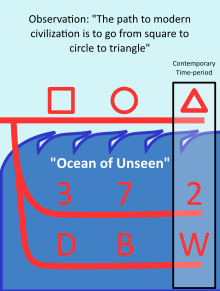Conworlds:Nathan–Robball debate: Difference between revisions
No edit summary |
m (4 revisions imported) |
(No difference)
| |
Latest revision as of 18:03, 7 July 2023
The Nathan–Robball debate was a debate between Nathan112 and Robballgamer2009 which took place on the Alternate History Discord on 11 May 2023 at 9:00 PM EST, and lasted approximately 90 minutes. Nathan and Robball were invited to debate by T0oxi22 to discuss the age-old question of convergence in Alternate History, including in regards to determining plausibility. The topic was sparked by Nathan's theories of convergent history in the recently published The Paradox of Convergent History, which was criticized by Robball in his The Convergence of Paradox. While both authors rebuked a form of "orthodox OTLism", Robball argued that Nathan's position on timeline writing still fundamentally rested on or in relation to OTL. The debate also touched on concepts of a materialist approach to alternate history, comprising the basis of Robballism
Debate
| This page is part of a series on |
| Robballgamer2009 |
|---|
 |
|
Related topics |
| This page is part of a series on |
| Conworlds philosophy |
|---|
 |
| Community |
|
Collaboration |
| Content |
|
Categories |
| Miscellaneous |
|
User-specific
|
|
Hosting |
The debate began with Robball describing Nate's "Chaos Theory" as presenting a "false solution" to the problem of OTList convergence, determining his analogy of using "OTL history like a painter's palette" to still result in a product based on OTL, and calling this method a form of confirmation bias in favor of real life, modern history as a means of assessing realism. In particular, he disagreed with the idea of OTL being an "equilibrium" that each alternate history trends toward should enough time pass. Nate defended this use of OTL by claiming that civilizations follow the same "abstracted patterns" if at a similar level of development, without outside intervention. A fundamental disagreement emerged on the progression of history: Nathan defended the probability of OTL developments eventually occurring the further out one travels from the POD, and defended viewing OTL history as a mostly linear progression of "more history" as time passes, which the ATL timeline is in relation to (whether running parallel, converging toward, or diverging). Robball argued the alternate history timeline was a further diverging branch off the original timeline, with no relation to the original timeline, and that Nathan's position was still fundamentally "subservient to our own specially endowed world", because its developments were measured in how much far or close they were to OTL developments.
Nathan defended his position by stating that his view was based on empirical observation of the currently existing world, especially similarities between multiple civilizations of the world, not just a singular civilization. However, Robball countered with the model of the "Ocean of Unseen", stating that while on the surface the currently existing reality appears empirically as the only possible path of development, this is only true so long as we are unaware of the paths that the currently existing reality did not take. Robball would later call Nathan's position not as scientific as he implied, as while it is based on inductive reasoning, it fails to take into account variables we cannot know or independently test.
Nathan then asked if Robball agreed or not with his statement that divergence is sometimes "critically necessary", to which Robball countered that plausibility is not critically in need of convergence or divergence, because plausibility is an "instantaneous measurement", i.e. not measured in relation to amount of converging/diverging. Nathan refused this position, stating that divergence is necessary if for example the most plausible option is divergence, reframing timeline writing as the act of choosing in each event either converging or diverging, because the ATL writing is in some relation to the same sequence of events in OTL, determined by the rate of change of the distance between the two sets. Robball called this giving preferential treatment to a "main" timeline, and likened the divergent/convergent method to viewing writing as righting a boat to a particular course. He asked, given infinite time, would a timeline diverging from OTL inevitably have to swing into convergence.
Robball also stated that while they both use the "fundamental building blocks" of distances between events, his own method uses these blocks to create new events, rather than choose between already knowable and available events. For Nathan, his alternate timeline would be "agnostic" to how close it was to OTL, but Robball claimed that a timeline can only be agnostic as far as the writer is, and that by viewing one's timeline as always far or close to OTL, one must necessarily not be agnostic. Nathan came back to the question of "righting the boat" by describing timelines as "weaving" back and forth around the OTL trend line on average, which Robball called the crux of their disagreement: viewing alternate history as "weaving" or being in relation to OTL. Nathan described this as a natural flowing, cautioning to also not be divergent for the sake of it, and stating that he was against forcing anyone to have to do either converging/diverging, however, Robball countered that Nathan must be assuming some requirement to do something, by viewing a certain historical development as "natural". He stated that while both claim to not be prescribing any particular action, Nate's position inherently requires a plausible timeline to follow a certain path. He proposed weighing every decision on its own merits, not in relation to any certain path or similarity level to OTL.
Nathan gave the hypothetical of the CSA winning the civil war and proceeding to conquer the North as proof that certain premises are implausible, to which Robball replied the appropriate analogy would be if he wrote that timeline and made it completely plausible, but Nathan rejected it because of a fundamental belief such as "seceding nations never conquer their home countries" from observing only what has occurred in OTL. The debate concluded with Robball asserting that scenarios were only implausible in so far as they lack necessary background and justification.
Concepts
Ocean of Unseen
In the course of presenting his argument, Robball coined the term "Ocean of Unseen" to describe the nature of how we view historical development. Whereas Nathan argued that his approach was scientific, as it was based on observing the progression that occurred in our own world, and noting the "abstract patterns" that make up the timeline up to the contemporary date, Robball argued that in addition to the current timeline there are other potential timelines which are equally as valid in reaching a contemporary date, using different abstract patterns, but that we cannot see them because they are obscured from our own observation. This is to say, other possible situations are in the "Ocean of Unseen", whereas our own history is on the surface and seems self evidently the only path to the present, based on a surface level reading. Therefore, while Nathan's argument appeared empirical, Robball claimed that it lacked scientific validity because it could not take account of the variables we do not know or can't observe.
The Ocean of Unseen related to a fundamental aspect of the disagreement, which was whether or not there is a certain general trend, reflected in OTL, which explains how humanity progresses. Robball came down on the side that there was no inherent or particular path to the present day, as from the perspective of someone outside OTL, the "original timeline" is not of special significance. However, Nathan argued that the original timeline reflected a natural progression of events.


